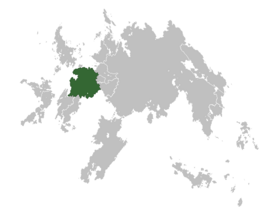User:Finium/Sandbox3: Difference between revisions
Jump to navigation
Jump to search
(Created page with "{{Infobox former country |native_name = <!-- Name in a modern syntax of native language(s). Leave blank if name is only in English. S...") |
No edit summary |
||
| Line 142: | Line 142: | ||
|footnotes = <!-- Accepts wikilinks --> | |footnotes = <!-- Accepts wikilinks --> | ||
}} | }} | ||
The '''Cathartic Empire of Cornicae''', later called the '''Lavarian Empire''', was a large imperial state in western [[Gaia]] that was active from the early 17th century to shortly after the conclusion of the [[Continental War (Gaia)|Continental War]]. Prior to the Piloro's endorsement of the reigning monarch Marius I, the House of Cambra ruled a parallel state called the Kingdom of Cardeale and Bracelon. In 1605, the Piloro recognized Marius I as the paramount physical authority of [[Ditanery]] and legitimized his annexation of [[Brilliania]], during which he deposed the [[Marism|Marist]] Princes who had previously denied the religious authority of the Piloro. | |||
Revision as of 17:19, 5 December 2019
Cathartic Empire of Cornicae | |||||||||||||
|---|---|---|---|---|---|---|---|---|---|---|---|---|---|
| Anthem: Hymn of the Wood | |||||||||||||
 | |||||||||||||
| Capital | Cambra | ||||||||||||
| Religion | Cathartic Ditanery | ||||||||||||
| Demonym(s) | Cornice | ||||||||||||
| Government | Monarchy | ||||||||||||
| High King | |||||||||||||
• 1605-1665 | Marius I | ||||||||||||
• | ... | ||||||||||||
• 1905-1943 | Peter X | ||||||||||||
| |||||||||||||
| |||||||||||||
The Cathartic Empire of Cornicae, later called the Lavarian Empire, was a large imperial state in western Gaia that was active from the early 17th century to shortly after the conclusion of the Continental War. Prior to the Piloro's endorsement of the reigning monarch Marius I, the House of Cambra ruled a parallel state called the Kingdom of Cardeale and Bracelon. In 1605, the Piloro recognized Marius I as the paramount physical authority of Ditanery and legitimized his annexation of Brilliania, during which he deposed the Marist Princes who had previously denied the religious authority of the Piloro.